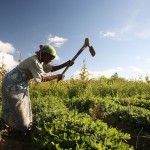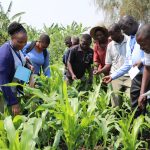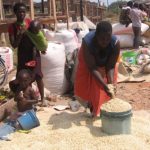This price bulletin for selected legumes, roots, tubers, and other cereals was developed by researchers at IFPRI Malawi with the goal of providing clear and accurate information on the variation of weekly retail prices of selected agricultural commodities that are important for food security and nutrition in Malawi. The reports are intended as a resource […]
Discussion Paper 02068: Relative Roles and Limitations of Extension Approaches in Promoting Sustainable Agricultural Management Practices
Low-cost and sustainable agricultural management practices are being promoted in many countries but continue to face low adoption among farmers. We tracked the awareness and adoption among farmers of a number of practices―soil cover, minimum tillage, crop rotation, intercropping, crop diversification, crop residue incorporation, pit planting, water harvesting, and organic fertilizer―in two rounds of a […]
Book Chapter: Delivery of social protection programs to combat COVID-19 in Africa
The COVID-19 pandemic has prompted governments across the world to introduce unprecedented lockdowns and other restrictions on mobility to slow the spread of coronavirus and to avoid overwhelming healthcare systems. While often necessary, these measures have led to well-documented disruptions in economic activity (World Bank 2020e). Consequently, many experts and international organizations have raised serious […]
Virtual Event: Nationally Representative Estimates of the Cost of Adequate Diets, Nutrient Level Drivers, and Policy Options for Households in Rural Malawi
Abstract: A growing literature uses the cost of diets to evaluate how effectively a food system supports access to nutritious foods. We identify baseline levels, nutrient drivers, and potential policy-induced changes in the feasibility and cost of meeting nutrient requirements for whole households based on aggregate needs in rural Malawi from 2013 – 2017. We […]
IFPRI Maize Market Report November 2021
The Monthly Maize Market Reports are developed by researchers at IFPRI Malawi, with the main goal of providing clear and accurate daily maize price data in selected markets throughout Malawi. The reports are intended as a resource for those interested in maize markets in Malawi, namely producers, traders, consumers, or other agricultural stakeholders. Highlights • […]
- « Previous Page
- 1
- …
- 61
- 62
- 63
- 64
- 65
- …
- 79
- Next Page »





